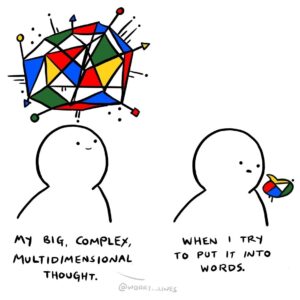Nestled within the heart of every individual’s journey lies a remarkable truth: the power to transform resides within. As Art Therapists, we embark on a quest guided by this profound belief—a belief that each person carries within them the potential for change.
Art therapy uses creative expression as a means of communication and exploration. It’s a process where individuals engage in various art-making activities under the guidance of a trained Art Therapist to address emotional, psychological, and even physical challenges. The question of whether art therapy is right for you is a significant one, and it’s essential to delve into what this approach entails to make an informed decision.
Understanding Art Therapy
At its core, art therapy recognizes the inherent connection between creativity and well-being. Through the act of creating art, individuals can access and express thoughts, feelings, and experiences that may be difficult to articulate verbally. This process can be particularly beneficial for those who struggle with traditional talk therapy or find it challenging to express themselves through words alone.
Art therapy sessions can take various forms, including painting, drawing, sculpting, collage-making, and other visual and expressive arts activities. The focus is not on producing aesthetically pleasing artwork but rather on the process of creation and the insights that arise from it. Clients are encouraged to explore their inner world, confront difficult emotions, and gain new perspectives through their artistic endeavors.
Is Art Therapy Right for You?
Deciding whether art therapy is right for you involves considering several factors:
1. Comfort with Creative Expression:
Are you open to exploring your thoughts and feelings through art-making? While artistic skills are not required for art therapy, a willingness to engage in creative expression is essential. If you feel drawn to the idea of using art as a tool for self-discovery and healing, art therapy may be a suitable option for you.
2. Communication Preferences:
Do you find it challenging to express yourself verbally? Art therapy provides an alternative means of communication for individuals who struggle to articulate their thoughts and emotions through words alone. If you resonate with this approach and believe that visual expression could help you communicate more effectively, art therapy may offer valuable benefits.
3. Emotional Processing:
Are you seeking a therapeutic approach that allows for deep emotional exploration? Art therapy can be particularly effective for processing complex emotions, trauma, grief, and other psychological challenges. Through the creative process, individuals can access subconscious thoughts and feelings, leading to greater self-awareness and insight.
4. Desire for Self-Exploration:
Are you interested in gaining deeper insights into yourself and your experiences? Art therapy provides a non-judgmental space for self-exploration and reflection. By engaging in art-making activities and discussing their artwork with a trained therapist, clients can uncover hidden aspects of their psyche, leading to personal growth and transformation.
The Role of the Art Therapist
Central to the art therapy process is the role of the Art Therapist. These professionals are trained in both mental health and fine arts, allowing them to facilitate therapeutic experiences that integrate visual expression with traditional psychotherapy techniques. Art therapists provide guidance and support as clients explore their artwork and delve into their inner experiences.
If you’re open to exploring your thoughts and feelings through art-making, struggling to express yourself verbally, seeking a therapeutic approach for deep emotional processing, or interested in gaining deeper insights into yourself, art therapy may be a valuable addition to your healing journey.
It’s essential to remember that the effectiveness of art therapy can vary from person to person, and finding the right therapist and approach is crucial. If you’re unsure whether art therapy is the right fit for you, consider scheduling a consultation. A qualified art therapist is available and waiting for you! Listen to your intuition and choose the path that feels right.
-Amber Dalzell, LCPC, ATR-BC, ATCS


